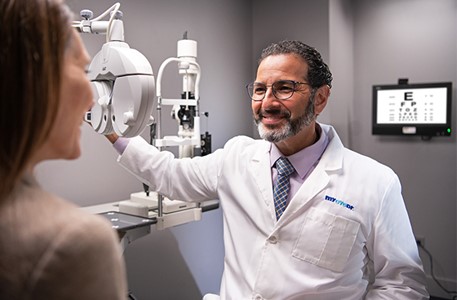Comprehensive Eye Center Panama City Florida for All Your Vision Demands
Comprehensive Eye Center Panama City Florida for All Your Vision Demands
Blog Article
A Comprehensive Overview to Eye Surgery Treatments Available at Your Ophthalmologist's Practice
In the realm of ophthalmology, the advancements in eye surgery treatments have actually opened up a globe of opportunities for those seeking improved vision and eye wellness. From the extensively well-known LASIK eye surgery to the less acquainted Corneal Transplants, the array of procedures available at your eye physician's practice can attend to a selection of vision-related concerns.
LASIK Eye Surgery
When considering vision correction procedures, LASIK eye surgical procedure emerges as a popular selection for individuals looking for long-lasting enhancement in their eyesight. LASIK, which stands for Laser-Assisted in Situ Keratomileusis, is a popular refractive surgery that aims to fix typical vision issues such as nearsightedness, astigmatism, and farsightedness. This treatment involves utilizing a laser to reshape the cornea, allowing light to be appropriately focused onto the retina, causing clearer vision without the requirement for glasses or call lenses.
One of the crucial advantages of LASIK eye surgical procedure is its fairly pain-free and quick nature. The procedure itself usually takes only about 15 mins per eye, with a lot of people experiencing boosted vision practically quickly. Additionally, the recovery time for LASIK is fairly brief, with lots of people able to go back to their regular activities within a day or 2.

PRK (Photorefractive Keratectomy)
FIRST SENTENCE:
An additional innovative vision improvement procedure similar to LASIK is PRK (Photorefractive Keratectomy), supplying effective services for individuals seeking choices to conventional glasses or contact lenses. PRK is a procedure that reshapes the cornea utilizing an excimer laser to deal with refractive mistakes such as nearsightedness (nearsightedness), hyperopia (farsightedness), and astigmatism. Unlike LASIK, PRK does not involve creating a flap on the cornea; instead, the external layer of the cornea is carefully eliminated prior to the laser treatment. This makes PRK an ideal option for people with slim corneas or those associated with tasks where the threat of eye injury is higher.
The recuperation period for PRK is longer compared to LASIK, as the outer layer of the cornea requires time to regenerate. Patients may experience discomfort and blurred vision during the initial healing phase, but vision gradually boosts over numerous weeks. Your ophthalmologist will offer in-depth post-operative treatment directions to make sure a smooth recovery procedure and optimum aesthetic end results.
Cataract Surgery
Cataract surgery, a typical procedure performed by eye doctors, involves removing the over cast lens within the eye and replacing it with a clear artificial lens implant to recover vision clarity. Cataracts occur when the all-natural lens of the eye ends up being over cast, resulting in blurred vision and difficulty seeing plainly. During cataract surgical procedure, the eye doctor makes a small laceration in the eye and utilizes ultrasound technology to separate the gloomy lens, which is then gently suctioned out. Once the cataract is removed, the artificial lens, called an intraocular lens (IOL), is inserted to replace the natural lens's function. This IOL helps to concentrate light onto the retina, boosting vision. Cataract surgical treatment is typically executed on an outpatient basis and is known for its high success rate in improving vision and high quality of life for individuals. It is important to seek advice from your ophthalmologist to determine if cataract surgery is the right choice for you based on your specific eye health demands.
Corneal Transplants
Corneal transplants, also understood as corneal grafts, are medical treatments that entail changing damaged or infected corneal tissue with healthy benefactor tissue to boost vision and relieve corneal conditions. This treatment is normally suggested for individuals with corneal scarring, thinning, or various other corneal conditions that can not be dealt with effectively with other techniques such as medication or contact lenses.
During a corneal transplant, the eye doctor gets rid of the main section of the damaged cornea and replaces it with a contributor cornea. This donor tissue is very carefully chosen, examined, and stored to make certain compatibility and lower the risk of being rejected. Corneal transplants can bring back vision, minimize discomfort or pain, and enhance the appearance Go Here of the eye.
There are different kinds of corneal transplants, consisting of full-thickness transplants (passing through keratoplasty) and partial-thickness transplants (such as endothelial keratoplasty or former lamellar keratoplasty), with the selection depending upon the certain condition being treated. After the surgery, patients need close post-operative like keep an eye on healing and stop complications.
Retinal Detachment Surgical Procedure
Complying with successful corneal transplants, an additional critical eye surgery procedure that may be needed for specific individuals is retinal detachment surgical procedure, a delicate operation focused on bring back the retina's proper setting to protect vision and avoid more issues (eye center panama city florida). Retinal detachment happens when the retina, the slim layer of tissue at the back of the eye in charge of capturing light and sending out visual signals to the brain, retreats from its normal placement. This separation can result in vision loss if not immediately resolved with surgical procedure
During retinal detachment surgical procedure, the ophthalmologist functions to reattach the retina to the back of the eye. There are different surgical strategies readily available, including pneumatically-driven retinopexy, scleral clasp, and vitrectomy, with the selection depending upon the intensity and details qualities of the detachment. The goal of the surgical procedure is to stop vision loss and enhance or restore vision if possible. After the treatment, individuals may need to adhere to a post-operative care Discover More Here strategy to enhance healing and aesthetic results. Early detection and treatment of retinal detachment are crucial in preserving vision and avoiding irreversible vision impairment.
Verdict

In the world of ophthalmology, the improvements in eye surgical procedure therapies have actually opened up a world of opportunities for those seeking enhanced vision and eye wellness. From the widely recognized LASIK eye surgery to the less familiar Corneal Transplants, the range of procedures offered at your eye medical professional's technique can deal with a range of vision-related problems. It is essential to seek advice from with your eye physician to figure out if cataract surgery is the right alternative for you based on your private eye health and wellness requirements.
Adhering to effective corneal transplants, another vital eye surgical treatment view it treatment that may be required for particular individuals is retinal detachment surgical procedure, a fragile procedure intended at restoring the retina's correct placement to maintain vision and prevent further problems.In verdict, there are numerous eye surgical procedure therapies readily available at your eye medical professional's technique, including LASIK, PRK, cataract surgery, corneal transplants, and retinal detachment surgical treatment.
Report this page